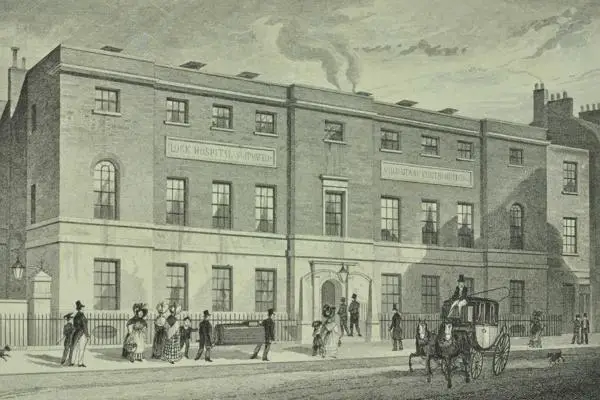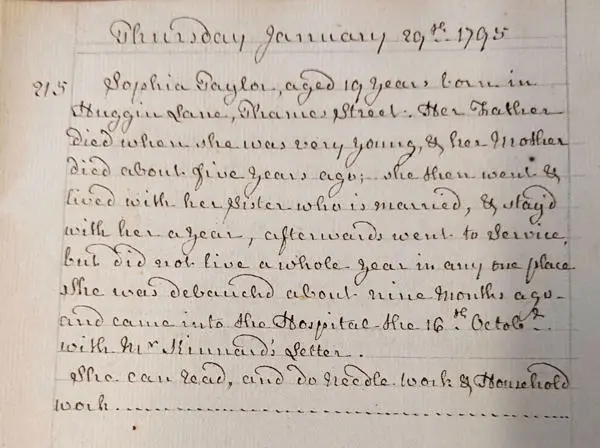RCS partnership
Royal College of Surgeons of England in partnership with LMA
RCS Archives Manager Vicky Rea and Archives Assistant Saffron Mackay set out the benefits of partnering with London Metropolitan Archives and describe a collaborative research project with LSE, entitled Recovering Women, which used complementary sources from the RCS and LMA collections to trace the lives of patients at the London Lock Hospital and Asylum.
From 2017 until July 2021 the Royal College of Surgeons of England Archives was based at LMA while the College building was closed for re-development. The RCS archive collections were moved into the LMA store, our service users viewed our collections in the LMA reading room and our archives team were based in the LMA office.

Partnering with LMA in this way enabled RCS to keep our archives reading room and enquiry services running throughout our building project, which was our key strategic goal. Beyond that, being based at LMA raised the profile of RCS Archives and was a great opportunity for our staff from a small, specialist repository to see how a major record office operates and to learn from the expertise of the LMA teams across collections management, public services, engagement and learning, and conservation. It also provided an invaluable opportunity to work collaboratively, combining our collections.
Our first joint venture was to co-curate a mini-conference around the less well known aspects of the history of healthcare, which was unfortunately postponed due to the pandemic. Towards the end of 2020, RCS staff drew on LMA’s London School of Medicine for Women (H72/EGA/02/01/005) and the Royal Free London NHS Foundation Trust (H71/RF/Y/02/01/003) collections for an article ‘Rebels, ground-breakers and trailblazers: the first ladies of surgery: the history of women's entry into the surgical profession’, which was published in the RCS Bulletin. This year, we collaborated on a research project with LSE, entitled Recovering Women, which used complementary sources from the RCS and LMA collections to trace the lives of patients at the London Lock Hospital and Asylum.
London Lock collection (RCS Archives MS0022)
The Lock Hospital was founded in 1746 by the surgeon William Bromfeild and was the first voluntary hospital in London for the treatment of venereal diseases. After their treatment at the hospital, some female patients were referred to the Lock Asylum for the Reception of Penitent Female Patients which was founded by the Bible commentator, the Rev. Thomas Scott, for the ‘reclamation of the cured inmates to virtuous habits’. These were typically young women, some orphaned or without family, others simply unfortunate in love. Many had experienced abuse and worked as prostitutes. They were taught needlework and other skills in the hope that these would prepare them for a life in domestic service.
Recovering Women project
The Recovering Women project focussed on a single volume of patient histories from the Asylum dating from 1787 to 1808 (MS0022/6/10). Entries give the name, age and place of birth for each woman, followed by more substantial information regarding their family circumstances, work history and how they came to be admitted to the hospital. Entries conclude with details of their discharge, usually into service, although many ran away or died in the Asylum. The volume is unusual in that it does not contain any details of the medical treatment given to the patients, and instead focuses on their social circumstances. It is likely that the biographies were compiled to use for fundraising purposes because, like all voluntary hospitals at the time, the Lock was dependent on donations from subscribers to survive. The volume of patient histories is a unique source of evidence on a group of Georgian women whose lives would have been hidden at the time.
“It’s a population you don’t hear about even though as historians there’s been a long tradition of trying to recover the voices and lives of people who are too marginal to leave their own words.”
- Professor Patrick Wallis, LSE

The aim of the project was to recover the histories of the women in the volume by conducting further research into them using complementary sources at LMA. It involved three public workshops, hosted online by LMA, in which archivists and historians from LMA, RCS and LSE helped members of the public to undertake research using the LMA dataset on Ancestry. The online sessions quickly sold out, and around 90 members of the public attended in total. The workshops were designed to help delegates develop their research skills and the resulting crowdsourced research will be published by Patrick Wallis for LSE.
LMA Ancestry datasets
Since the patient histories pre-date the census, the key to unlocking the women’s stories was using eighteenth and nineteenth century family history sources for London, including parish records of Baptisms, Marriages and Burials and Poor Law records including Workhouse Admission and Discharge Records. These are all available at Ancestry or at LMA.
During the workshops, delegates began to trace information about where the women came from, their family members and professions, who referred them to the Asylum and what happened after they left. Further avenues of research might include City Directories, which could reveal where women went into service after discharge. Mapping the women’s locations onto Layers of London would help to visualise clusters of patients and trace the sex trade in Georgian London.
Complementary sources
Using complementary sources from the LMA collection gave RCS Archives a different perspective on how to engage with our collections and enabled us to use our records in an innovative way to reach a different audience beyond the history of surgery. The Recovering Women project serves to demonstrate how the collections at LMA can complement records held in specialist repositories. Partnering with LMA was also hugely beneficial to RSC Archives in giving us access to LMA staff expertise, not only in London archive sources, but also in organising, promoting and delivering events.
RCS Archives left LMA in July and we will be reopening our services in the new Royal College of Surgeons of England building in Lincoln’s Inn Fields in the autumn (for further information see the RCS website). We look forward to continuing our partnership with LMA in the future, drawing out further links between our collections and discovering how they can add value to each other.